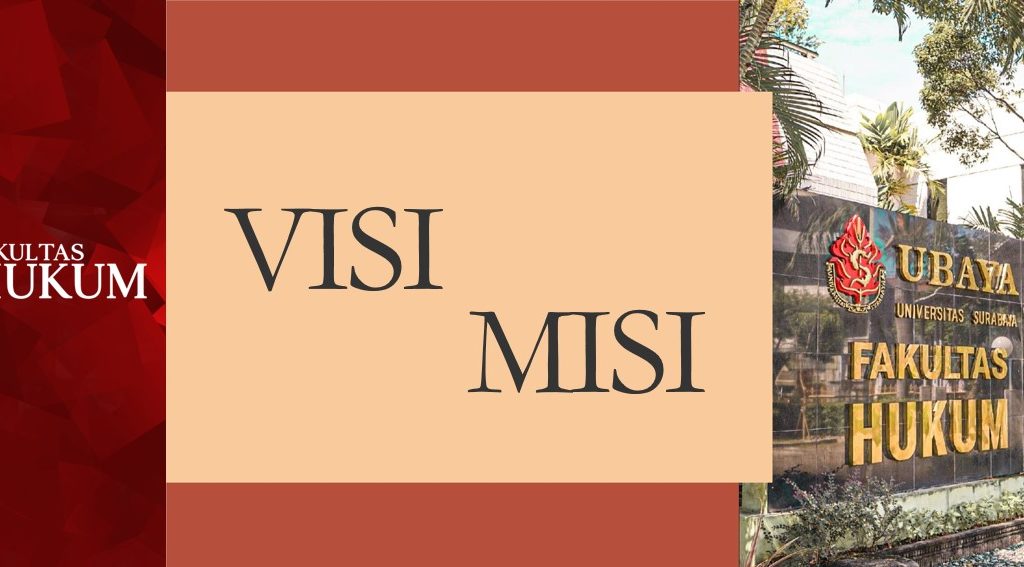(ind)
VISI:
Menjadi fakultas hukum yang berkualitas untuk memenuhi kebutuhan hukum bagi masyarakat
MISI:
- Menyelenggarakan Pendidikan Tinggi Hukum sesuai dengan perkembangan Hukum Nasional dan Internasional
- Melaksanakan dan mengembangkan Penelitian serta Pengabdian Kepada Masyarakat
- Mendorong terwujudnya komunitas Fakultas Hukum untuk mampu berperan aktif di Tingkat Nasional dan Internasional
MAKNA:
Menjadi fakultas yang memperoleh apresiasi yang tinggi dari masyarakat karena memiliki kualitas keilmuan dan penerapan di bidang pengajaran, penelitian dan pengabdian kepada masyarakat, serta memiliki kualitas layanan hukum yang sesuai dengan kebutuhan masyarakat
TUJUAN
- Pelaksanaan Tridarma yang merangsang perkembangan pengetahuan di bidang hukum, menghasilkan lulusan yang relevan dengan tuntutan masyarakat bisnis dan industri, (reguler dan continuing education), mengembangkan Fakultas Hukum sebagai pusat informasi dan layanan hukum.
- Manajemen organisasi berbasis kompetensi yang sesuai dengan tuntutan perubahan dan budaya organisasi universitas.
- Perluasan jaringan kerjasama dengan berbagai pihak (stakeholder dan lembaga pendidikan) di bidang pembelajaran, penelitian dan layanan hukum.
PROFIL LULUSAN
- Menguasai pengetahuan ilmu hukum dasar
- Mampu menganalisis permasalahan-permasalahan hukum yang berkembang di masyarakat berdasarkan hukum yang berlaku di indonesia
- Menguasai, menganalisis dan menyelesaikan permasalahan-permasalahan hukum sesuai dengan minat dan konsentrasinya
- Memiliki ketrampilan hukum
- Berbahasa indonesia dengan baik dan benar, serta
- Memiliki kemampuan berbahasa inggrismampu berkomunikasi dengan baik, memiliki wawasan global, dan menguasai teknologi informas
- Mampu berdikari atau mandiri.
(eng)
VISION
“To become a qualified Faculty of Law that fulfil the legal needs of the community.”
MISSIONS
- To organise higher education in accordance to the development of national and international law;
- To carry out and develop research and community service;
- To encourage the realisation of a community of law faculties who are able to play an active role at national and international levels.
PROGAM EDUCATIONAL OBJECTIVES
- Producing graduates who are able to answer the legal needs of the community in the global era; and
- Form and develop cooperation networks in the field of research and legal services.
LEARNING OUTCOMES
- Able to define the different concepts applied in civil law, criminal law, administrative law, constitutional law, and international law.
- Able to classify the different concepts applied in civil law, criminal law, administrative law, constitutional law, and international law.
- Able to explain the applicable laws in force in Indonesia.
- Able to describe the procedural laws in force in Indonesia.
- Able to explain the legal system in Indonesia.
- Able to apply the rules of law into cases in the form of legal opinion.
- Able to draft a legal contract.
- Able to produce a legal document.
- Able to apply the appropriate legal provisions based on the information given to make a lawsuit.
- Able to examine deductively and inductively applicable rules of law into various cases and otherwise.
- Able to build a legal argumentation.
STRATEGY TO ACHIVE
- There are two targets to be achieved by the study program, namely: (1) the students obtain career knowledge and guidance according to their potential and can take advantage of conducive facilities in the process of personality maturation and professional attitude development and produce graduates who are able to implement legal science so that it can meet the needs of the community or continue to the next level of education. And the results of education, research and service to people who need, will have a high suitability that can meet the qualifications as demanded by the community and be able to carry out further self-development; and (2) the realization of an institutional network with other agencies, especially in the implementation of the tri-dharma of higher education.
- To achieve the above objectives, the achievement strategy is implemented through planning in the form of a strategic plan that is made for 4 years but is evaluated every year through the main objectives of the program. This strategic planning is made systematically through programs that will be implemented by study programs in the current one year period by adjusting the adequacy of funds owned by the study program. This plan is carried out based on a comprehensive study through coordinating meetings with lecturers, alumni and graduate users so that the main objective in the vision of the study program can be achieved to the maximum.
